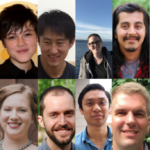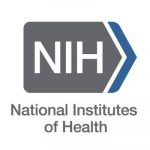The CSDE’s First Virtual Event Keeps Researchers Connected
|
On March 13, when groups of people could not be brought together in close physical proximity because of the COVID-19 pandemic, CSDE held its first virtual Trainees’ Lightning Talks and Poster Session. Affirming the strength of CSDE’s community and commitment to research while practicing social distance, more than 75 CSDE community members, including alumni across the country, gathered together online to watch seven graduate students give their brief insightful presentations on their research in demography, read the posters in a second window, and ask questions in the Q&A. Many participants also provided helpful feedback afterward on the research and effectiveness of the poster, supplementing the feedback provided earlier by a panel of CSDE Affiliates.
(read more)
|
 |
Congratulations to Award Recipients for Best Posters during CSDE’s Virtual Lightning Talks and Poster Session!
|
The CSDE Biannual Trainees’ Lightning Talks and Poster session showcases CSDE’s talented trainees and is an important community building event for demographers across campus. On March 13, CSDE held its first virtual Trainees’ Lightning Talks and Poster Session. Congratulations to Beatrix Haddock, (Institute for Health Metrics and Evaluation) and Yohan Min (College of Built Environments) who shared the best poster award. Beatrix presented “Differential Privacy in the 2020 Census: Considering Acceptable and Unacceptable Biases” and Yohan presented “Social Equity of Clean Energy Policies and Technologies in Residential Electric-Vehicle Charging”.
(read more)
|
 |
|
|
Trainee Spotlight: Yohan Min, Recipient of the Best Poster Award of the CSDE Winter 2020 Trainees’ CSDE Lightning Talks and Poster Session
|
Climate change has led to the development of new clean energy technologies. As more cars, heating systems, and other types of equipment are produced that require the new technologies, an uneven distribution of the clean energy systems in the 21st Century could create a solar and electrical divide, similar to the digital divide, with implications for greater inequality in air quality, health, and other quality of life dimensions across communities. CSDE Trainee Yohan Min studies social equity issues in access to clean energy technologies. His research reveals critical social equity issues that will likely grow over time as climate change and air quality worsen and the new clean energy technologies become more important. Yohan presented his research on the distribution of electrical vehicle (EV) chargers at the CSDE Winter 2020 Trainees’ Lightning Talks and Poster Session.
(read more)
|
 |
Spotlight: Beatrix Haddock, Recipient of the Best Poster Award of the CSDE Winter 2020 Trainees’ Lightning Talks and Poster Session
|
The US Census Bureau is required by the privacy law in the US Code to not reveal information about individuals, households, or businesses directly or indirectly through statistics. However, advancements in technology have made traditional methods to protect the identification of individuals and database reconstruction insufficient. Solving a huge system of linear equations and inequalities to reconstruct data is theoretically feasible with today’s computing power. The Census Bureau plans to use a new Differentially Private (DP) algorithm called TopDown to protect privacy in the Decennial Census and has asked for feedback from researchers, policy makers, and communities who use or affected by this data. Beatrix Haddock, data specialist at the Institute for Health Metrics and Evaluation (IHME) and part-time student at UW, presented research that addressed this call at the CSDE Winter 2020 Trainees’ Lightning Talks and Poster session.
(read more)
|
 |
Mitigating Impacts to Research Activities due to COVID-19: Important Updates from UW HSD and NSF
|
The University is closely monitoring COVID-19 and extensive emergency procedures are in place. Be sure to read UW’s coronavirus FAQ page, as it contains important information for everyone in the UW community. CSDE also has an ongoing post regarding mitigating impacts to research activities. Recent updates include:
- UW Human Subjects Division (HSD) temporarily halts some UW HSD research, effective Monday, March 23, 2020.
- NSF announced March deadline date extensions for some solicitations and Dear Colleague Letters (DCLs).
Please click this link for more details and updates.
(read more)
|
 |
NSF: Some March Deadlines Extended
|
NSF recently announced March deadline date extensions for some solicitations and Dear Colleague Letters (DCLs) Please click this link for a list of the solicitations or Dear Colleague Letters (DCLs) with extended deadline dates. Additionally, NSF strongly encourages that you check the NSF Coronavirus Website regularly to critical updates. This update is also on CSDE’s ongoing post on research updates due to COVID-19.
(read more)
|
 |
Friends of NCHS: Recommendation for the National Center for Health Statistics (NCHS)
|
The Friends of NCHS is a coalition of public health associations, patient organizations, scientific societies, and research institutions who rely on the information produced by the National Center for Health Statistics (NCHS) within the Centers for Disease Control and Prevention (CDC). In order to support NCHS’s continued work to monitor the health of the American people and to allow the agency to make much-needed investments in the next generation of its surveys and products, the Friends of NCHS recommend an appropriation of at least $189 million for the agency in fiscal year (FY) 2021.
(read more)
|
 |
Do you have an active NIH grant? Competitive Supplements or Revisions are Available to Study 2019 Novel Coronavirus
|
NIDA has just issued a call to those with active NIH grants or cooperative agreements for urgent supplements or submissions. The call is available to review can be found here: NOT-DA-20-047.htm. NIDA is seeking revisions or supplements that can address research on: whether substance use is a risk factor for the onset and progression, how HIV among persons who use substances may impact the onset and progression of COVID-10, system-level responses to COVID-19 mitigate or prevent risk in secure settings like prisons and jails, etc. Click below to read more and to see the list of research interests.
(read more)
|
 |
|
|

